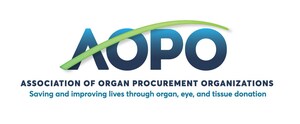MCLEAN, Va., March 23, 2021 /PRNewswire/ -- The Association of Organ Procurement Organizations (AOPO) applauds Health and Human Services' (HHS) move to accept additional comments on Centers for Medicaid and Medicare Services' (CMS) rules affecting organ donation and transplantation. AOPO, the national voice of the 57 federally designated Organ Procurement Organizations (OPOs), responded with recommendations that will align the organ donation and transplantation system to achieve 50,000 organ transplants annually by 2026, saving significantly more lives than what the proposed rule imagines.
"Real patient lives hang in the balance so any policy changes must be carefully considered. Unfortunately, rules put forth at the end of the last Administration oversimplify an incredibly complex system based on misguided data," explained Joe Ferreira, AOPO President. "We support reform and the necessary accountability for performance that enables more alignment, and we welcome opportunities to collaborate with CMS and other stakeholders toward our shared goal of saving more lives."
AOPO points out that CMS relied on a non-peer-reviewed study by the Bridgespan Group during the rule process, leading to misleading assumptions about OPO performance. The report asserted that approximately 28,000 extra organs are available each year that do not get recovered or transplanted because of OPO performance breakdowns. Among the assumptions the report makes is that 100% of all eight organs from every single donor will be medically suitable for transplantation, whereas the current average is approximately three organs per donor. And that 100% of organs offered by OPOs will be accepted by the transplant centers and recipient candidates. The current rejection rate for available kidneys is around 20%. The U.S. has the world's best donation and transplantation system, but assuming 100% success rates in each of these areas is unsupported by scientific fact.
Under the new regulations, CMS advances a forced competition model designed to be run by community-based nonprofits that, up until now, have depended on collaboration for their mutual success. OPOs competing for donation service areas will hinder information and best practice sharing critical to driving system improvement, particularly improving health equity in the organ procurement and transplantation mission.
"AOPO supports the overall goal of improving performance in order to save more lives. However, the new tiered competition model proposed under the rule has the potential to disrupt the collaborative efforts that have led to year over year increases in organ donation over the last 10 years," said Steve Miller, AOPO CEO. "Given the interdependent nature of the organ donation and transplantation system, we propose a collaborative effort which will save substantially more lives."
OPOs are already on pace to surpass CMS' performance predictions. Further, AOPO recently announced a groundbreaking effort to reach 50,000 organ transplants annually by 2026. The goal represents a 50% increase over current annual figures, and it sets the OPO community on the path to exceed CMS' expectation of 41,000 annual transplants during the same time period.
Meaningful progress will require a coordinated, system-wide effort to boost collaboration, improve and align performance metrics, and deploy targeted interventions to address the current system's most acute failures. This includes utilizing the thousands of organs per year being recovered by OPOs from complex and older donors but declined for transplantation by transplant programs and addressing racial equity gaps in organ donation and transplantation.
AOPO is the non-profit organization recognized as the national representative of the 57 federally designated OPOs responsible for facilitating the organ, eye, and tissue donation process. AOPO leads the nation's organ donation community through innovation, advocacy, and education to pursue the day when every donation opportunity results in lives saved.
Contact: |
Sandra Remey, 301-467-9024 |
Shawn Flaherty, 703-554-3609 |
SOURCE Association of Organ Procurement Organizations

Related Links
WANT YOUR COMPANY'S NEWS FEATURED ON PRNEWSWIRE.COM?
Newsrooms &
Influencers
Digital Media
Outlets
Journalists
Opted In




Share this article